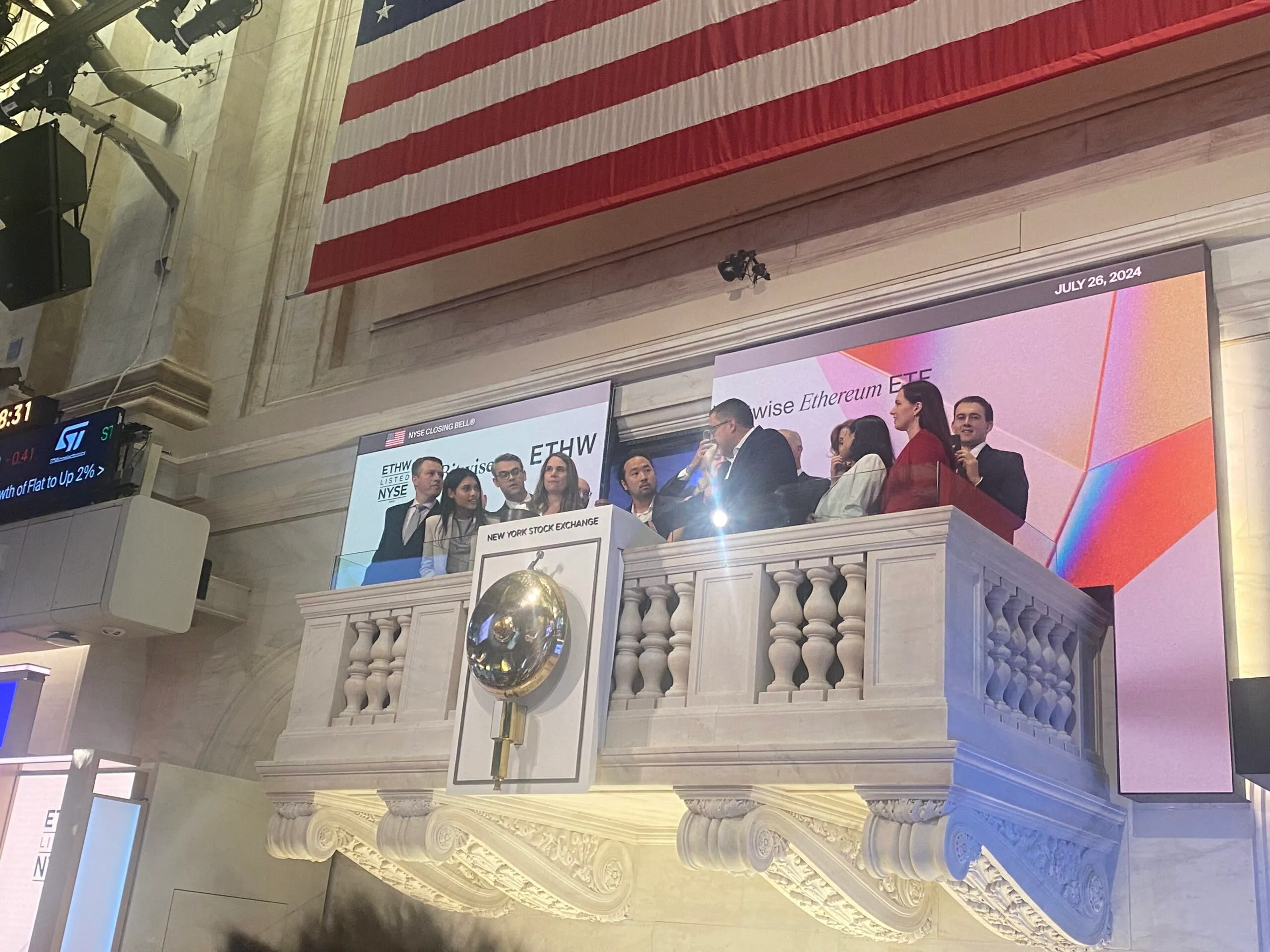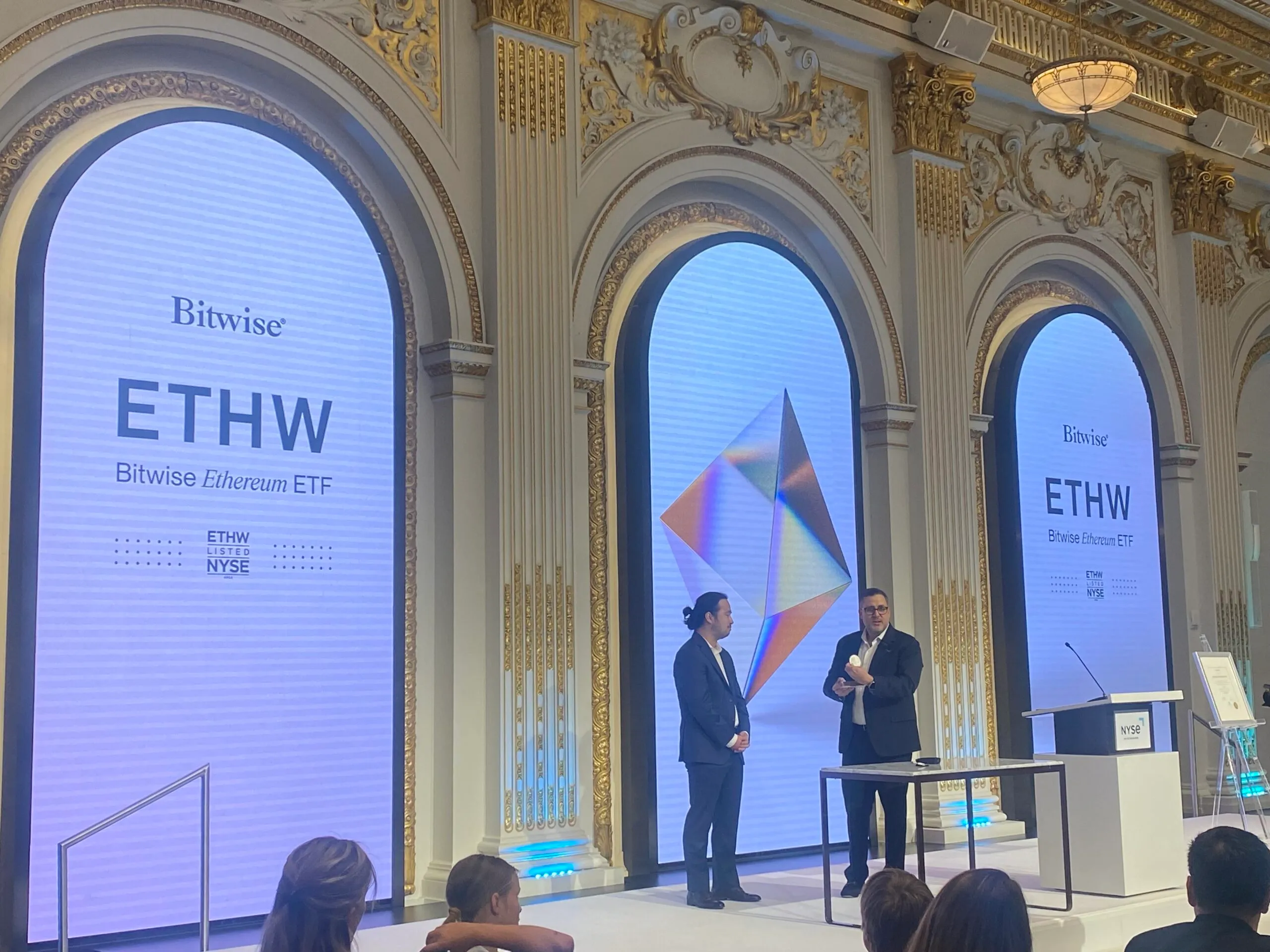
Over the 121-year old facade of the New York Stock Exchange, a freshly printed Ethereum ETF banner hung like a hoisted pirate flag. Tourists stopped, stared, and pointed. The younger ones explained what Ethereum was to their families, and guessed about the ETF part.
The imagery was powerful and undeniable: Ethereum had conquered Wall Street. Or maybe it was the other way around?
Inside the NYSE on Friday afternoon, investment bankers, asset managers, and a few NFT heavyweights gathered to celebrate the arrival of spot Ethereum ETFs in the United States by ringing the exchange’s closing bell. They were there at the invitation of Bitwise, one of the first nine spot ETH ETF issuers.
The mood was triumphant—and with good reason: In their first week of trading, spot ETH ETFs kicked off with a “very solid” start, according to analysts, raking in hundreds of millions of dollars.
But among Manhattan’s banking elite, a mild unease stewed. These people weren’t crypto novices; they’d brought spot Bitcoin ETFs to the masses months before, with great success. But Ethereum was a different beast, and some were having trouble pinning it down. Ethereum was another cryptocurrency, sure, but it wasn’t the cryptocurrency. It was a type of software, right? Maybe you could spin it as the future of the internet?

It was a common theme at the New York Stock Exchange on Friday. The Bitcoin pitch was relatively easy: It’s digital gold, so the narrative goes. But Ethereum? That’s much harder.
One way to explain it to TradFi clients, as I overheard on Friday, is to liken ETH, the native cryptocurrency of the Ethereum network, to stock in iOS, Apple’s operating system for iPhone apps.
That’s an effective description, but one not lacking for irony. Earlier this year, the U.S. Securities and Exchange Commission (SEC) looked poised to condemn ETH as an unregistered security. So, sticking with the iOS stock analogy, that would have categorized ETH as an illegal, unregistered stock in Ethereum, a network that supports thousands of decentralized applications.
But then, the agency abruptly moved to approve spot Ethereum ETFs in May under apparent political pressure, effectively declaring Ethereum to be a commodity. Wall Street was taken completely off-guard.

Some bankers present at the bell ringing ceremony were there to dip their toes, in a sense, into the still-murky cryptoverse. Maybe they’d get involved with crypto one day, but obstacles remained—namely, how to get their skeptical colleagues to understand products like Ethereum on a conceptual level.
Seeming to pick up on the vibe, Bitwise co-founder and CTO Hong Kim gathered the group in an upstairs ballroom to kick off the afternoon with an unscripted speech, acknowledging that there were many definitions of Ethereum floating around, some of which he disagreed with.
Kim then offered his own explanation of Ethereum: a shared public computer, on which users around the world can build shared public programs that no one person owns or controls. He likened the system to an “infinite garden,” tended to by many gardeners—including the people in the room.

After Kim’s speech, and after the group was shepherded down to the stock exchange floor for the bell ringing ceremony, several attendees approached Kim to shake his hand and commend his succinct explanation of Ethereum’s long-term promise.
But the Bitwise co-founder acknowledged that even within his own company, his take on Ethereum wasn’t the sole definition most people deferred to. ETH, Kim told Decrypt, still means a lot of different things to a lot of different people. Part of this, he said, is because ETH is “five years behind” an asset like Bitcoin in its technological journey.
“To say that there’s a little bit less fidelity, consensus, or agreement on what exactly it even is, is a fair statement,” he said of Ethereum.
He paused for a moment, thinking of the right words.
“But that also describes the more expansive opportunity that Ethereum has as well,” he added.
A few minutes later, everyone headed out for a nearby happy hour to commemorate the occasion. Tourists watched as the group of sharply dressed executives spilled out from the stock exchange’s front steps, talking amongst themselves. The gardeners tending to the world’s first public computer looked like any other bankers heading home for the weekend.